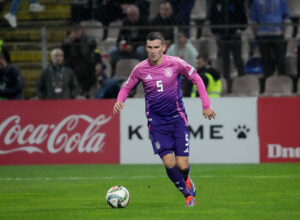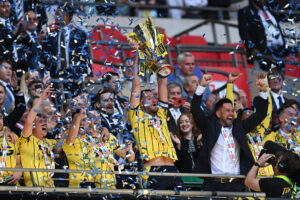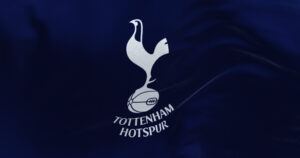Niall Horan, Louis Tomlinson, Zayn Malik; all three have decided to try it on their own, and all three still are incredibly similar. It’s not that all pop music sounds the same, it’s that it is the same.
In 2011 the comedy-music troupe Axis of Awesome released a music video for their cult-hit Four Chord Song. At it’s heart is a four chord progression derived from Pachelbel’s Cannon. The music video, shows the band playing 47 of the top pop hits of all time, all using the same four chords, in the same progression. From Journey’s Don’t Stop Believin’, to Five for Fighting’s Superman, the songs all fit the same progression. Even though the songs are individually different, and they don’t all include the progression the comedy troupe sets them to, they still flow seemlessly together.
At their core, they are all the same. A simple solution that has been mass-produced. It’s easy to make, easy to consume, and easy sell. In a word, it’s turnkey.
657 days. 1.8 years. That is the average tenure of a manager in the English Premier League. The idea of one man leading a club over the span of 1000 games is simply unheard of; with one exception.
Arsene Wenger
From the very beginning the man they call “Le Professeur” has defied expectations. The first foreign manager to win the league, the most FA cup wins, and of course, the only man to finish the season without a loss to his name. His name appears so often in the history books that he should be given co-author credits, and still there is one feat that tops them all. 1,642. For 1,642 games Arsene Wenger has struggled with his zipper. He’s sat musing on the bench, and he’s gazed out at the pitch brow furrowed, his hands shoved into his pockets.

The man has shepherded the club through the construction of a new stadium, transformed them into one of the world’s most reputable clubs, and all the while ensured they were a European constant. For two decades Arsene Wenger has been a calming hand, steering the Gunners down the path he feel best suits them. And for the most part it’s worked out. The issue is that that path is formulaic.
It’s been 19 different iterations of the same four chords, until eventually the 20th time around the French-maestro didn’t chart. For the first time those four chords failed, or more accurately that iteration did. In reality those four chords were just as good as they had always been. Over the past 10 season the Gunners have finished with 70–75 points seven times. The other three: 68 points, 79 points, and 83 points.
The past ten seasons have been nothing more than a shuffling of the same four chords. A face-lift on the same formula, always hoping for better results, but creating a product simply designed to replicate the last iteration. Arsenal have become turnkey. Arsene has become turnkey.
At the Scuola Allenatori, the training grounds for the best Italian mangers, there is a philosophy. A philosophy that states there is no correct way to play football. It’s a belief that the game is constantly evolving, a living organism, reacting to it’s environment, adapting to internal, and external forces exerting influences on it.
Renzo Ulivieri, the President of the Italian Football Managers Association, went as far as saying that he does not give any of the coaches reading material. He famously told Paulo Bandini, “What’s the point? If I were to write a book, that could take me two years. So by the time I give it to you, it’s already two years old. It’s out of date.”
The Scuola Allenatori doesn’t churn out managers; it trains philosophers.
It trains men like Arsene Wenger was, and sometimes, still is.
Over the years, Wenger has employed a 3–5–1, 4–4–2, 4–1–4–1, 4–2–3–1, and a 4–3–3. When given the opportunity, Wenger has consistently shown he is willing to, eventually, reinvent the way Arsenal play football — even going as far as to play a counter-attacking style in the biggest games.
But through all the games, there has been a constant. A penchant for flowing, artistic football. For tight movements in and around the box, and for patience in the final third. It’s been Wenger’s calling card, but for the last two seasons it’s been unusually absent. Even in a year when Arsenal’s magician Mesut Ozil led the league in assists, they came mostly from dead ball situations. Rarely were the Gunners the dynamic offensive force they had once been.
As a supporter, there is nothing more frustrating. Those movements were what drew me to Arsenal in the first place, but their absence isn’t necessarily a bad thing. If they were absent from Arsenal’s game as a result of a choice Wenger made, a decision to change the way the Gunners play, it would be something I could accept. Rather it feels as though the team simply lacks the ability to force their will onto even mid-table clubs.  Soon the Gunners will announce a two-year contract extension for Arsene Wenger, and in truth I’m not sure how I feel about it. Knowing Thomas Tuchel is available certainly is not helping the matter. The Gunners have earned their reputation as perennial fourth-place finishers. They’ve been nothing more than slightly modified iterations of the same team, the same four chords, just played a little differently. But at their helm is an innovator. A man who has shown before that he is not afraid to change the game, to be the influence that forces football to adapt. Now more than ever Arsenal needs Arsene. They need Le Professeur to teach one more lesson, to make the world reconsider what they know about football.
Soon the Gunners will announce a two-year contract extension for Arsene Wenger, and in truth I’m not sure how I feel about it. Knowing Thomas Tuchel is available certainly is not helping the matter. The Gunners have earned their reputation as perennial fourth-place finishers. They’ve been nothing more than slightly modified iterations of the same team, the same four chords, just played a little differently. But at their helm is an innovator. A man who has shown before that he is not afraid to change the game, to be the influence that forces football to adapt. Now more than ever Arsenal needs Arsene. They need Le Professeur to teach one more lesson, to make the world reconsider what they know about football.
These next two years won’t be the defining chapter in Wenger’s biography. They’ll be nothing more than a chapter or two, a tale of a slow, confusing end, but one that when it came was celebrated with the fanfare he deserved. No, these next two years are rather the cornerstone for the team that Wenger leaves. They will not change the lasting mark he left on the club, but they will be his legacy, and it’s a legacy that is in risk.
Already Spurs are showing they can contend with the best in England. With Harry Kane, and Christian Eriksen at the top, and Toby Alderweireld and Jan Vertonghen in the back, the team is more than capable of competing. For the time being Arsenal are backed by a bigger budget, but it’s not inconceivable that there may soon be a second north London team capable of drawing top-tier talent.
And that’s just one club.
Manchester United have already shown they are willing to unload trucks of money on the right player; by next season it’s likely that they’ll be starting two of the best French players in the world. Manchester City have already bought Bernado Silva, and are nowhere near finished. Chelsea have shown they are still capable of dominating the league, and Jurgen Klopp’s Liverpool squad is at worst on par with the top six, and steadily improving.
Arsenal can no longer be content with turnkey seasons. Finishing with 75 points can no longer be the goal. The teams around them have improved, and the Gunners have been stagnant, and now they find themselves at a crossroads.
The next two years are Wenger’s final legacy. His ability to shape the team to continue it’s success. To compete long-term, and continue to be a fixture in European competition. To do so, he will need to seriously reconsider how the game should be played, the caliber of players the team must field, and above all the standard of play Arsenal is willing to accept.
If he doesn’t Arsene will leave the Gunners exactly as he found them: the ghost of a once great club.
Main Photo: ST ALBANS, ENGLAND – MAY 24: Arsene Wenger the Arsenal manager during his press conference at London Colney on May 24, 2017 in St Albans, England. (Photo by David Price/Arsenal FC via Getty Images)






